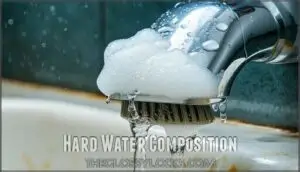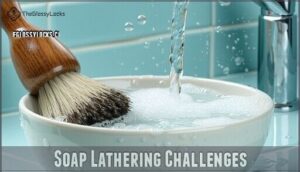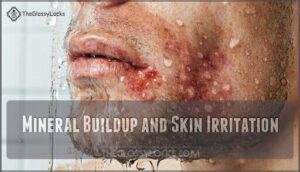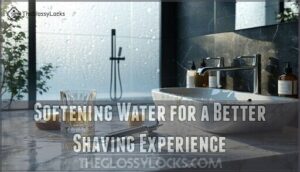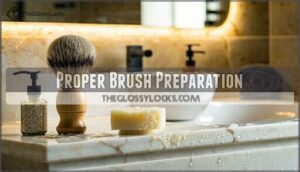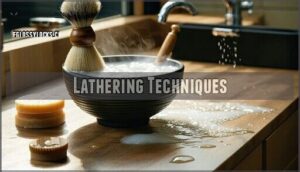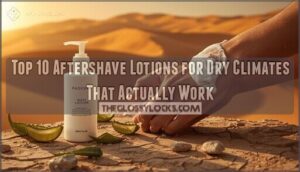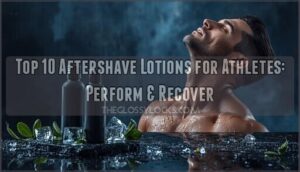This site is supported by our readers. We may earn a commission, at no cost to you, if you purchase through links.
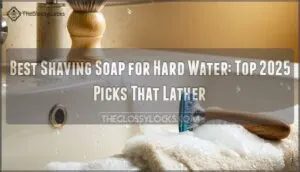
You need the best shaving soap for hard water – ones with chelating agents like EDTA or sodium citrate.
These ingredients grab calcium and magnesium before they steal your soap molecules. Tetrasodium EDTA works best for extremely hard water, while disodium EDTA handles moderate mineral levels.
Look for soaps specifically formulated with these water-softening compounds. They transform stubborn minerals into allies, creating the creamy cushion your razor craves.
Without them, you’re fighting chemistry itself – those minerals literally hijack your lather before it forms. Smart formulations beat hard water every time, turning mineral-heavy tap water into perfect shaving conditions.
Table Of Contents
- Key Takeaways
- The Best Shaving Soaps for Hard Water
- Understanding Hard Water and Its Impact on Shaving
- Softening Water for a Better Shaving Experience
- Ingredients and Techniques for Improved Lathering
- Frequently Asked Questions (FAQs)
- What is the best soap for hard water?
- How to shave with hard water?
- What is hard shaving soap?
- How to use Castile soap for hard water?
- What is the best shave soap?
- Can you make shaving soap lather up with hard water?
- How to use shaving soap?
- What soap does not work in hard water?
- What is the alternative for soaps while washing in hard water?
- How do shaving soaps compare to traditional shaving creams?
- Conclusion
Key Takeaways
- Choose soaps with chelating agents like EDTA or sodium citrate – these ingredients grab calcium and magnesium minerals before they can interfere with lather formation, giving you rich foam instead of soap scum.
- Look for triple-milled tallow-based soaps from brands like Stirling and DR Harris – these formulations resist mineral interference and maintain structural stability in hard water conditions.
- Master your lathering technique by loading your brush for 30-60 seconds and using hot water – extended loading compensates for mineral interference while hot water helps dense soaps create better glide.
- Consider water treatment solutions if you’re serious about wet shaving – water softeners, descaler systems, or even bottled water can transform your shaving experience by addressing the root cause of poor lathering.
The Best Shaving Soaps for Hard Water
When hard water meets your morning routine, it turns shaving into a battle you didn’t sign up for. Hard water’s minerals create soap scum instead of rich lather, leaving you with razor burn and frustration.
The solution lies in choosing the right shaving soap for hard water. Stirling Soaps and DR Harris lead the pack with their hard water solutions. These brands pack soap ingredients like EDTA and chelating agents that bind those troublesome minerals.
Catie’s Bubbles offers unique scent combinations while delivering excellent lather quality in mineral-rich water. Tallow-based shaving soaps like Mitchell’s Wool Fat provide superior shave comfort through their lanolin content.
Triple-milled soaps maintain structural stability, preventing that slimy mess hard water shaving usually creates. The best shaving soap for your situation depends on your water’s mineral content, but these proven performers consistently deliver that perfect lather you’re after.
Understanding the importance of shaving soap ingredients is vital for making an informed decision when selecting a shaving soap for hard water.
Understanding Hard Water and Its Impact on Shaving
Hard water contains high levels of calcium and magnesium minerals that mess with your shaving routine by preventing proper soap lathering.
Hard water’s minerals turn your morning shave into a frustrating battle against weak lather and razor burn.
These minerals create soap scum instead of rich, creamy lather, leading to poor razor glide and potential skin irritation from inadequate lubrication, which is a result of the inadequate lubrication.
Hard Water Composition
Your tap water’s mineral content determines how well your shaving soap performs.
Calcium levels above 40 mg/L and magnesium impact from 10-50 mg/L create ionic balance issues that prevent proper lathering.
When water pH shifts due to these minerals, your hard water shaving routine suffers.
Understanding hard water composition helps you choose the right shaving soap hard water formulation for reliable hard water solutions.
Soap Lathering Challenges
Creating perfect lather formation with hard water feels like an uphill battle.
Minerals bind with soap molecules, creating soap scum instead of rich foam. Your lather stability drops substantially when calcium and magnesium interfere with the process.
Here’s what you’re fighting against:
- Water temperature changes don’t fix mineral binding issues
- Lather formation drops by 40% in mineral-rich environments
- Soap scum coats your brush bristles and skin
- Mineral content creates tight, rapidly dissipating bubbles
- Traditional shaving soap lather becomes thin and weak
Hard water composition makes achieving that creamy consistency nearly impossible without the right approach.
Mineral Buildup and Skin Irritation
Calcium and magnesium deposits cling to your skin like stubborn guests after shaving with hard water.
These mineral buildup particles create a rough film that blocks pores and triggers razor burn.
Your skin’s pH shifts, making it more prone to irritation.
Triple milled shaving soap fights back with mineral removal agents, protecting your skin while delivering quality lather that actually works.
Understanding water hardness levels is essential to addressing the underlying causes of these skin issues.
Softening Water for a Better Shaving Experience
If you’re tired of weak, disappointing lather despite using quality shaving soap, your hard water might be the culprit.
The good news is that you can transform your shaving experience by addressing the water quality itself, giving your favorite soaps the chance to perform as intended.
Water Descaler Systems
Looking at water quality solutions? Water descaler systems offer an affordable path to better lathering without major plumbing changes.
These electromagnetic or electronic devices alter mineral behavior, reducing scale buildup by up to 50% in most conditions. Unlike traditional softeners, descalers don’t require salt usage or extensive maintenance costs, making them perfect for renters.
When considering water treatment options, understanding water descaler systems is essential for improving shaving soap performance.
Here’s what makes water descaler systems worth considering:
- System efficiency varies by water chemistry but typically prevents 40-70% of scale formation
- Water filters combined with descalers can further improve shaving soap performance in hard water conditions
- Descaler types include electromagnetic, capacitive, and template-assisted crystallization models starting around $200
- Maintenance costs stay minimal since most systems need no salt refills or regular servicing
Whole Home Water Softeners
Whole home water softeners offer a permanent fix for hard water shaving problems.
These systems use ion exchange to swap calcium and magnesium for sodium ions, creating softer water throughout your house.
| Feature | Details | Benefits |
|---|---|---|
| Water Softener Costs | $1,000-$2,800 installed | Better lather, less mineral buildup |
| Salt Usage | Refill every 6-8 weeks | Moderate maintenance requirement |
| System Installation | Professional setup required | Treats all household water |
Using the right salt purity levels is vital for peak performance.
Your shaving soap for hard water will perform like never before.
Filter replacement and maintenance tips keep systems running smoothly for 10-15 years, making water softening a smart long-term investment.
Bottled Water Alternative
If you don’t want a whole home system, bottled water offers a quick fix for better lathering with your shaving soap.
It’s pricier than tap water filters or soap additives though. You can also try lather boosters and mineral removers as cost-effective hard water solutions.
These water softening alternatives help your shaving soap ingredients work better against water hardness without major plumbing changes.
Using bottled water shaving products can be an effective way to improve shaving results with water softening systems.
Ingredients and Techniques for Improved Lathering
You can boost your lather quality in hard water by choosing soaps with chelating agents like EDTA or citric acid that neutralize minerals.
Start with proper brush prep and master your lathering technique for consistent results every time.
EDTA, NTA, EDDS, and IDS
Beyond water softeners, you can look for chelating agents in your shaving soap ingredients.
EDTA, NTA, EDDS, and IDS work as mineral binders that grab onto calcium and magnesium before they mess with your lather.
These soap additives act like tiny magnets for hard water minerals.
EDDS and IDS break down faster than EDTA, making them greener choices for lather enhancers.
Using the right hard water soap ingredients is essential for a better shaving experience.
Proper Brush Preparation
Start your brush care routine with a two-minute warm water soak. This bristle soaking softens natural fibers and preps synthetic brushes for ideal lather creation.
A proper brush prep sets the foundation for rich lather, even in stubborn hard water.
Shake out excess water gently – you want damp bristles, not dripping wet ones. Your shaving brush becomes the perfect partner for hard water challenges when properly prepped.
Handle maintenance means treating your brush right from the start, which includes a proper two-minute warm water soak and gentle handling to ensure the brush is prepped for ideal lather creation.
Lathering Techniques
With your brush ready, now master lathering techniques for hard water success.
Load your brush for 30-60 seconds—this extended loading compensates for mineral interference. Water temperature effects matter: use hot water with denser soaps for better glide.
Choose bowl vs face lathering based on preference, but add water gradually. Check lather consistency often—it should feel cushioned, not thin.
Perfect shaving lather takes practice with wet shaving hard water conditions. Some soaps contain biotin for hair strength which could offer additional benefits.
Frequently Asked Questions (FAQs)
What is the best soap for hard water?
DR Harris and Stirling soaps excel in hard water conditions. Their tallow-based formulations with chelating agents resist mineral interference, creating rich lather when others fail completely.
How to shave with hard water?
Use triple-milled tallow soaps, soak your brush longer, lather with hot water, and consider chelating agents like EDTA. These ingredients bind minerals that interfere with foam production in hard water.
What is hard shaving soap?
Hard shaving soap refers to traditional soap with a firm, solid consistency that requires water and a brush to create lather, unlike soft creams that squeeze from tubes.
How to use Castile soap for hard water?
Castile soap won’t work well for shaving in hard water. It’s made from olive oil and lacks the tallow or specialized ingredients needed to create proper lather with mineral-rich water.
What is the best shave soap?
Finding your perfect lather companion means considering your water’s mineral content.
DR Harris and Stirling soaps excel with tallow-based formulations that resist calcium interference.
Their triple-milled consistency creates rich, protective foam even when minerals try sabotaging your routine.
Can you make shaving soap lather up with hard water?
Yes, you can lather shaving soap with hard water, but it takes more effort.
Choose triple-milled tallow soaps with chelating agents like EDTA that bind minerals and prevent soap scum formation.
How to use shaving soap?
Soak your brush in hot water for two minutes.
Load the damp brush with soap using circular motions.
Add water gradually while building lather on your face or bowl until you achieve rich, creamy consistency.
What soap does not work in hard water?
Like Achilles’ heel, most standard grocery store soaps crumble under hard water’s mineral assault.
Barrister and Mann soaps (except their Latha line) struggle badly with calcium buildup, creating weak, disappointing lather that’ll leave you frustrated with the overall lather.
What is the alternative for soaps while washing in hard water?
You can switch to chelating agents like EDTA or citric acid-based cleansers.
Use bottled distilled water, install a water softener system, or try pre-shave oils that help break down mineral buildup, using chelating agents can be beneficial.
How do shaving soaps compare to traditional shaving creams?
Coincidentally, you’re choosing between two shaving methods that handle hydration differently. Shaving soaps give you complete control over water content and lather thickness, while creams come pre-hydrated with less customization.
Conclusion
Picture your bathroom mirror fogged with steam, your razor gliding effortlessly across perfectly cushioned lather – that’s what happens when you choose the best shaving soap for hard water.
These specially formulated soaps don’t just work around mineral-heavy water, they transform it into your shaving ally.
With chelating agents like EDTA binding those troublesome calcium and magnesium ions, you’ll finally get consistent, creamy lather every morning.
Hard water doesn’t have to mean hard shaving anymore.

